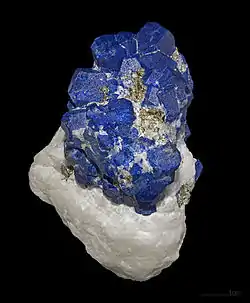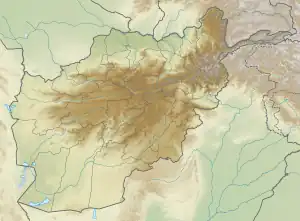Sar-e Sang
Sar-i Sang | |
|---|---|
 Lazurite from Sar-e Sang | |
 Sar-e Sang Location in Afghanistan | |
| Coordinates: 36°12′36″N 70°47′36″E / 36.21000°N 70.79333°E | |
| Country | |
| Province | Badakhshan Province |
| Time zone | + 4.30 |

Another Sar-e Sang Lazurite crystal, with the classic deep azure-blue color. Crystal is 4.5 cm wide.
Sar-i Sang (or Sar-e Sang) (lit. "stone summit" in Persian) is a settlement in the Kuran Wa Munjan District of Badakhshan Province, Afghanistan, famous for its ancient lapis lazuli mines producing the world's finest lapis.[1] It is located in the Koksha Valley.
Lapis lazuli mines
The Sar-i Sang lapis lazuli mine probably dates from prehistoric times. It consists of one old disused shaft and two new shafts. This was the main source of lapis lazuli in the ancient world, with lapis from here occurring in such famous archaeological discoveries as the Royal Treasure of Ur and the Tomb of Tutankhamun.[2]
See also
References
- ↑ "NGA GeoName Database". National Geospatial-Intelligence Agency. Archived from the original on 2008-06-08. Retrieved 2008-06-11.
- ↑ Warwick Ball, 2008, 'The Monuments of Afghanistan: History, Archaeology and Architecture': 261, London.
- Warwick Ball, 2008, 'The Monuments of Afghanistan: History, Archaeology and Architecture': 261, I.B. TAURIS, London, ISBN 978-1-85043-436-8.
- Warwick Ball, 1982, 'Archaeological Gazetteer of Afghanistan': Volume I: 1001. SAR-I SANG, Editions Recherche sur les civilisations, Paris, ISBN 2-86538-040-8
- Lapis lazuli mines at Sar-e Sang, Afghanistan at Mindat.org
- Sarah Stone, 'LAPIS LAZULI in pursuit of a celestial stone', EAST and WEST PUBLISHING LTD, London, 2010, ISBN 978-1-907318-03-0
External links
Wikimedia Commons has media related to Minerals of Sar-e-Sang District.
This article is issued from Wikipedia. The text is licensed under Creative Commons - Attribution - Sharealike. Additional terms may apply for the media files.